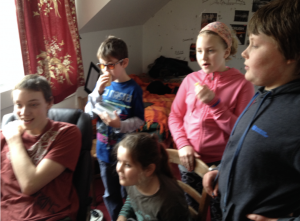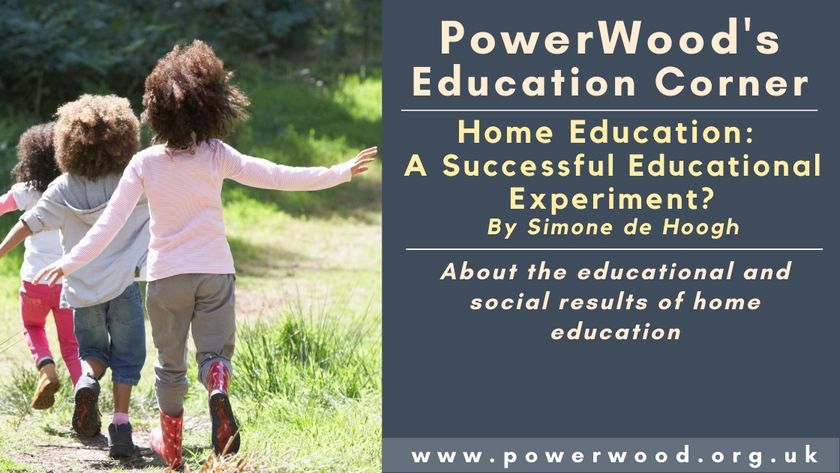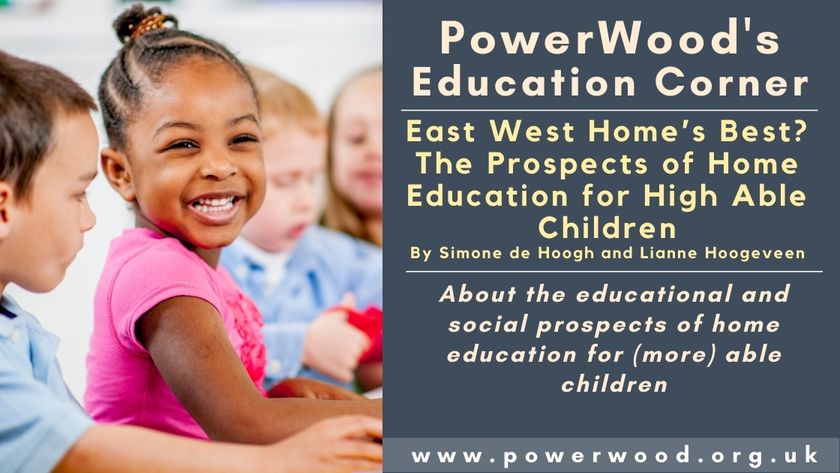
All articles in PowerWood’s Outside of the box Education Corner
East West Home’s Best?
The Prospects of Home Education for Gifted Children
By Simone de Hoogh and Lianne Hoogeveen
Paper handed out at the European Council of High Ability (ECHA)- conference at Lahti, Finland, 14 September 2006
Previous research confirms the effectiveness of home-education beyond a doubt: Parents and caretakers who choose home-education create an environment for the child, in which it can develop its abilities in both social and intellectual fields, regardless of the educational level or social position of the parents.
Parents who choose home-education are capable of educating their children better than schools do, in cognitive as well as social areas. Home-education has proven to be a more than valuable form of education both cognitively and socially (Basham, 2001; Bester, 2002; Blok, 2002; Ray, 1997, 2004a; Rothermel, 2002; Rudner, 1999; Thomas, 1998; Wakelkamp, 1996).
Home Educated Girls
Home educated adolescent girls are more assertive, confident, and free-thinking compared to traditionally schooled girls, as confirmed by research conducted by Harvard University, among others (Sheffer, 1997). Sheffer (1) (1997) interviewed fifty-five home educated adolescent girls who learned at home and in the community. She found that these girls, unlike their peers in schools, were able to hold on to strengths they had as children and to resist challenges to their sense of self.
Both English and American research shows that the gender-gap disappears with home education (Ray 1997, Rothermel 2002).
Home Education & Socio-Economic and Multicultural Backgrounds
For pupils attending regular school, the income or educational level of the parents serves as a reliable indicator of expected learning performance. It is very rare that students rise above their parents’ level (Dam & Vermunt, 2003). With home-education, on the other hand, children achieve a higher than average result, regardless of the educational level or social position of the parents.
A parent’s education background has no substantive effect on their children’s’ homeschool academic performance, according to this study. Home educated students’ test scores remain between the 80th and 90th percentiles, whether their mothers have a college degree or did not complete high school.
Remarkably, students taught at home by mothers who never finished high school score a full 55 percentile points higher than public school students from families of comparable educational backgrounds.” (Ray & Rudner, 2001)
A long-term study in Great Britain also showed that working-class children who receive home-education scored better than school-going children of middle-class parents (Rothermel, 2002).
It seems as if schools are less able to compensate for these differences, than are home-educating parents, and thus working-class children are, relatively speaking, better off when home-educated (Basham, 2001; Blok, 2002; Ray, 1997, 2004a; Rothermel, 2002).
Black parents are mostly determined to set forth a movement where their children are not associated with or brought down by the stigma of academic under-achievement and educational apathy. (2)
A growing number of black mothers are educating their children at home. James, who started a website called The National African-American Homeschoolers Alliance in January 2003, says there are more than 100,000 black families teaching their children at home. (3)
How many gifted among home educators
Introduction
In nearly all American books about home education (March 2006, www.amazon.com 437 titles), (highly) giftedness gets a mention. For example, in the book Homeschooling the child with ADD (or other special needs), there were seven examples of (highly) gifted children with learning disabilities (Hayes, 2002, p. 42, 48, 60, 108, 134, 213).
In books about home educated adults, there is a high percentage of (highly) gifted people. In Home-schoolers success-stories by Linda Dobson (2000), of the 15 adults, at least 8 persons were (highly) gifted.
In “An ‘A’ in life, Famous Home Schoolers” Mac en Nancy Plent (1999) describe an impressive list of eminent figures in history who were home educated:
“These men [Abraham Lincoln, George Washington], and the men and women we talk about in the following pages, were often successful because of this lack of formal instruction, not in spite of it. They had the advantage of caring parents and a love of learning. Their curiosity wasn’t dampened by being chained to someone else’s timetable, and their studies weren’t systematically diverted into boring channels. They were, for the most part free to follow a path dictated by their inner drives, gently guided by family. (p. 1)”
Robinson and Nobel (quoted in Silverman, 2000,) find it:
“…disturbing to consider how high a proportion of eminent people in history were home tutored” (p. 168).
Existing research
Only a few scientific articles have been written on home education specifically in combination with giftedness. Ensign (2000) wrote about the good results for home educated twice-exceptionals.
Heinbokel (2004) wrote about home education and distant learning for gifted children, which also can be seen as a form of home education as long as the responsibility for the education rests with the parents and personalisation of the education is possible.
Regularly, it has been researched why parents choose to home educate. Some of the reasons parents give could possibly be connected with (highly) giftedness. Fortune-Wood (2005, p. 28) ascertains that 44% of the families in their first year of home education, chose home education because of the bullying at school. (Highly) gifted children are (if there are no special measures done for them at school), even more emotionally vulnerable, due to their emotional intensity (Silverman, 2000, chapter 1), and therefore probably sooner a victim of bullying than the average child.
In a research conducted by the French home education organisation ‘Les Enfants d’abord’ (4) 97 families (38%) of the parents gave as a reason to home educate: ‘Enfant en avance scolairement’ (Fandard & Nozarian, 2002). [translation: “The children advance scholastically”]

The US Department of Education reported that in 1999, 11,6% of the home educators gave the following reasons for home educating: “school is not challenging enough for the child”; and 1,8% chose home education “because the child is not old enough to be allowed to start school” (Basham, 2001).
Bester (2002) in Zuid-Afrika wrote that parents chose home education because they were not satisfied with the lower academic standards and negative socialisation that are present in schools.
Meadows, Abel & Karenes (1992) reported in their research among 40 home educated children in the countryside of Mississippi, that 20% of the parents gave as the most important reason to home educate, “to meet the needs of a highly intelligent child” (p.15).
In some unpublished research of 46 children with an IQ between 148-200+ (Kearney, 1991), 22% of the children were home educated. Surprisingly, it also showed that nearly half of the 46 children had been home educated sometime between kindergarten and university.
Within the researches in the field of home education, it is evident that the home educated children perform beyond the average expectations. Rothermel (2002) of the University of Durham in Great-Britain, wrote in her research about home education (she researched 419 home educating families):
“The results show that 64% of the home-educated reception-aged children scored over 75% on their PIPS Baseline Assessments, as opposed to 5.1% of children nationally. The National Literacy Project (Years 1, 3, 5) assessment results reveal that 80.4% of the home-educated children scored within the top 16th percentile (of a normal distribution bell curve), whilst 77.4% of the PIPS Year 2 home-educated cohort scored similarly.”
With a closer look at the bell-curve of the English language test, one sees that of the six-year olds 70,5%, of the 8 year olds 20%, and of the 10 year olds 35,3% score the highest, contrary to the 3% of children nationally.
Own Observations
As a contact-person for Levenderwijs (5), I talked mostly by phone with many parents, often the mother, who were considering home education. Out of all contacts with parents through the website Levenderwijs, about 50% of the concerns were regarding a (highly) gifted child (September 2003 until March 2005).
Giftedness and Home Education
If parents are not satisfied with the school education, they look for an appropriate alternative like home-education (Karnes & Marquardt, 2003). Access to the internet opens the door to all kinds of information and resources, and high-ability children can concentrate on a special subject, without being forced to stop every fifty minutes to go to another class, or limit themselves to the level of the textbooks or curricula (Gallagher, 2003).
Home-education makes it possible to individualise the education for high-ability children.
Home-education gives all highly and differently gifted children a chance to flourish in a way that is tuned to their unique needs (Rivero, 2002, p.182-184). The gifted child or youth can quickly become competent in the basics, and then accelerate – through instruction by special tutors or mentors – in any area of special giftedness or interest such as science, history, painting, geography, or instrumental music (Ray, 2004b, p. 12). Moreover, home-educated highly gifted children with learning disabilities (twice-exceptionals), are self-confident students, and although their academic skills may develop at uneven rates, they usually achieve academic proficiency by high school (Ensign, 2000, p.157).
Howard Gardner is Professor of Cognition and Education and wrote over twenty books . He is best known for his theory of “Multiple Intelligences” “ [….] the greatest advantage of home-schooling: one can stop each day at what seems a good point and pick up there the following day. In contrast, mass schooling is almost inevitably a Procrustean affair: one either strains to keep up with others, or slackens one’s pace to avoid antagonizing the less able.” (Gardner, 2002)
The Research
Considering the amount of literature, the (indirect) research results, the reasons why parents home educate, and the high test results achieved by home educated children; it is a reasonable conclusion that (highly) gifted children are being home educated.
Participants
The participants were home educating parents at two annual home education gatherings: The Home Education Seaside Festival (Hesfes)(6) in England (n:81), and the North European Home Education Gathering in Sweden(n:23).
Instrument
The questionnaire for the parents of home educated children (7) exists of a list of 25 characteristics of giftedness, developed by Linda Silverman. Many home educating parents don’t know if their children are gifted. Next, they answered some more questions. Less than 19 ticks on the list of Silverman were considered as not gifted, 19 and more as gifted.
According to Silverman, parents are excellent identifiers of giftedness in their children: 84% of the children whose parents say that they fit 19 or more of the named characteristics score at least 120 IQ (the superior range). Over 95% show giftedness in at least one area, but are asynchronous in their development, and their weaknesses depress their IQ scores.
The Results
In Great Britain, 81 parents filled in the questionnaire about their home educated child between 6 and 17 years old. At the Hesfes there were about 600 children in this age-group (8). Twenty children had less then 19 ticks on the list of Silverman (25% of the total). Forty-six children had more then 19 ticks (57%), and fifteen children had less then 19 ticks but diagnosed or labelled gifted, by school, teachers tests and/or parents (19%) (Figure 1).
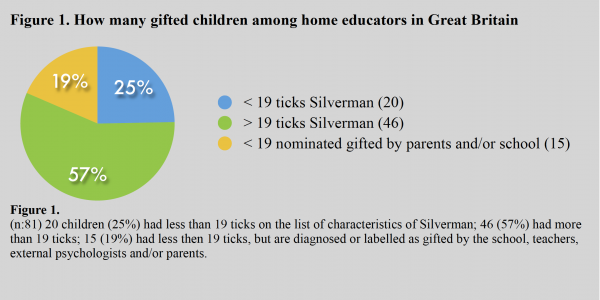
In Sweden, there were 33 children present, between ages 5 and 17, and I received 23 filled in forms from home educating parents. Two children had less then 19 ticks on the list of Silverman (9%). Fourteen children had more then 19 ticks (57%), and eight children had less then 19 ticks but
labelled gifted, by school, teachers tests and/or parents (35%) (Figure 2).
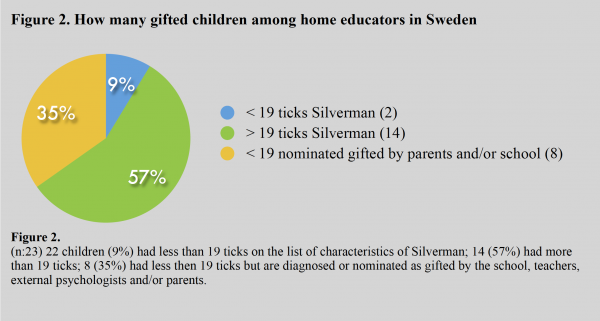
Problems preceding Home Education
Of the 40 gifted children at the Hesfes, 36 (90%) encountered problems at school. Of the 20 non gifted children, only 7 children (35%) encountered problems at school (Figure 3).
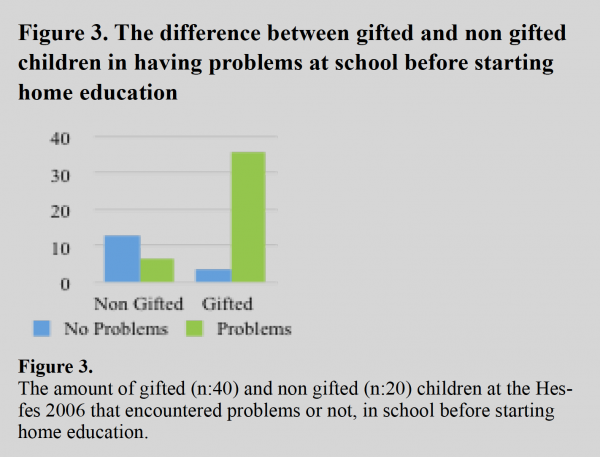
The problems the gifted children encountered at school were many.
Their educational needs were not met, they were (deeply) bored, bullied by classmates and also by teachers who couldn’t cope with their abilities and behaviour.
Twice-exceptional children were misdiagnosed. In Great Britain they also had problems with violence, behavioural problems, an eating disorder, and one child even became suicidal. Four children encountered no problems at school (Figure 4 and 5).
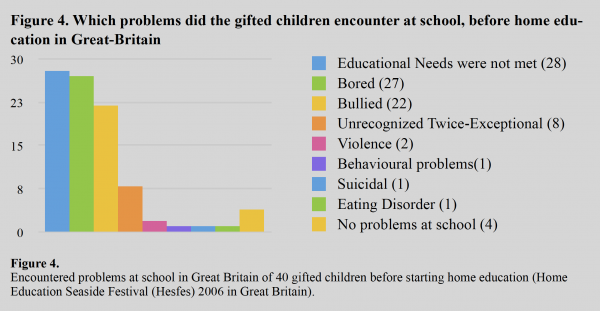
In Sweden one child had problems with social over-stimulation, and another child had problems because of the gender discrimination from the teacher (Figure 4 and 5).
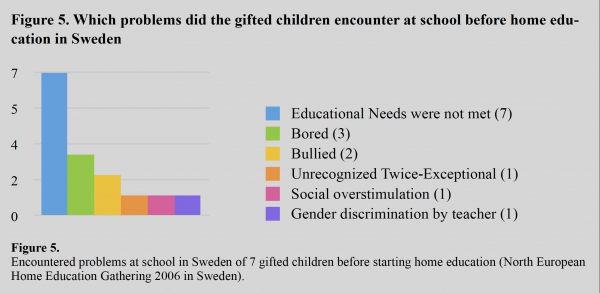
Home Education Effects on the high-able Child
Most parents (35 out of 46) stated in one way or another that an advantage of home education is being able to personalise the learning. The children could finally take the time and get the support to complete work according to their own (high) standards, dig into subjects as deep as they like, and work in their own pace, and follow their own interests and strengths, without pressure to conform.
Freedom to explore, discover, and learn in a relaxed happy environment.
They can develop all their strong fields, and learn to cope with their weak points, like one parent put it. Freedom to excel and freedom from the constraints of school, wrote another parent (Figure 6).
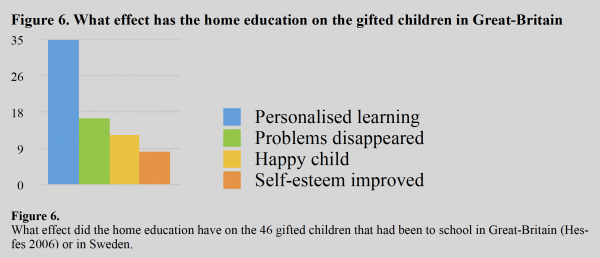
16 out of 46 parents stated that encountered problems at school, like unhappiness, stress, boredom, not being accepted, (disruptive) behaviour, uncooperative attitude, eating disorder, being uninspired, being bullied, seemed to disappear, to resolve, or to become more manageable (Figure 6).
Twelve parents stated that their children became happy again, were nicer to be around, became closer to the family and smiled again, and flourished. They were able to socialise with their intellectual peers. She is another child, as one parent put it (Figure 6).
Eight parents mentioned that the self-confidence/self-esteem came back or improved after starting home education. He became happy and confident again (Figure 6).
Conclusion
Among home educators, there seems to be an unexpectedly high percentage of gifted children. In Great Britain, of the 81 children in the research (of a total presence of 600 children), 61 seemed to be gifted. This would calculate to 75% of the home educated children present at the Hesfes 2006. In Sweden 21 of the 23 children seemed to be gifted. This would mean even a higher percentage.
Of the gifted children in this research who have been to school, 90% have encountered serious problems in school: educational needs not met, boredom, bullying, unrecognised twice- exceptional, etc. – which disappeared or improved after starting home education.
To the question “Did home education live up to the expectations you had before home education?”, 48 parents of gifted children of the total 61, stated “yes” in a very positive way: yes and tenfold more, far exceeded expectations (twice); totally, even more; 110%, of course!, etc. Six parents did not respond to this question, six had no expectations beforehand, and only one parent answered no.
“ [….] the greatest advantage of home-schooling: one can stop each day at what seems a good point and pick up there the following day. In contrast, mass schooling is almost inevitably a Procrustean affair: one either strains to keep up with others, or slackens one’s pace to avoid antagonizing the less able.” (Gardner, 2002)
Home education occurs as a very appropriate educational form for gifted children, which probably explains their over-representation among home educators.
The questions that emerge, and asks for further research:
- Are the problems that gifted children experience at school, school- or child-related?
- Why and how does home education work for gifted children?
- How come that home education, despite the good social and cognitive results for gifted children, is not readily available in all European countries?
‘Home-education is maybe the largest, most successful educational experiment of the last twenty years.’ (Daniel Pink, 2002)
More information about Home Education
Support in making an Informed Decision about Home Education
If parents want to be supported in making an informed decision about if and how to start home education or on another issue they are welcome to book a Free Introductory Talk with PowerWood’s founder Simone de Hoogh ‘ECHA Specialist in Gifted Education’, Qualified Coach, and Parenting Consultant and experienced home-educator herself by Zoom to explore if she could be of support for you.
Emotion Regulation
Multifaceted Emotion Regulation Theory (MERT) is a holistic theory developed by Simone de Hoogh. The theory explains how neurodiverse children, (young) individuals and parents of neurodiverse children can develop emotional regulation skills and direct their energy towards self-chosen goals, personally and professionally
Notes
- Sheffer Susannah Sheffer was the editor of “Growing Without Schooling”, a magazine initiated by John Holt, one of the godfathers of home education. http://www.holtgws.com/growingwithoutsc.html
- http://www.suite101.com/article.cfm/african_american_homeschooling/111986/2 (3 September, 2006)
- http://www.naaha.com/ (3 September 2006)
- http://www.lesenfantsdabord.org/
- www.leverderwijs.nl A virtual organisation for home educators in the Netherlands.
- www.hesfes.org.uk According to the site, Hesfes is the the largest home education gathering in the world.
- According to Andy Blewett, the founder and organiser of the Hesfes, there were about 600 children between 6-17 years, in 2006 at the Hesfes.
What about Qualifications
In this 3.5 minutes three home educated young people answer the frequently asked question “what about qualifications” and share their very different stories. Their experiences help to show how qualifications – or the lack of them – does not have to be a barrier for a home educated young person going onto to college or university.
References
- Basham, P. (2001). Home Scholing: From the Extreme to the Mainstream. Toronto: The Fraser Institute.
- Bester, D. (2002). Die effek van tuisskoling op die sosiale ontwikkeling en akademiese prestasie van die pre-adolessent (The effect of home education on the social development and academic prestation of the pre-adolescent). Graduation thesis at the University of South-Africa.
- Blok, H. (2002). De effectiviteit van Thuisonderwijs: een overzicht van onderzoeksresultaten (The effectiveness of home education: a review of research results). Nederlands Tijdschrift voor Onderwijsrecht en Onderwijsbeleid, jaargang 14, nr. 4, 151-163. http://www.sco- kohnstamminstituut.uva.nl/pdf/effectiviteit.pdf
- Dam, G. ten & Vermunt, J. (2003). De Leerling (The Student). in Verloop, N. & Lowyck, J. (Eds) (2003). Onderwijskunde . NL: Groningen/Houten: Wolters-Noordhoff
- Ensign, J. (1997). Homeschooling Gifted Students: An introductory Guide for Parents. ERIC EC Digest #E543.
- Ensign, J. (2000). Defying the Stereotypes of Special Education: Home School Students. Peabody Journal of Education, The home Education Movement in Context, Practise, and Theory. Volume 75, number 1& 2, 2000.
- Fandard, J. & Nozarian, B. (2002). Etude sur l’instruction a la maison 2000-2002 (Research on home education 2000-2002). Clermont-Dessous : Les enfants D’abord, association pour la liberté d’instruction.
- Fortune-Wood, M. (2005). The face of home-based education 1: Who, why and how. Nottingham U.K.: Educational Heretics Press.
- Gallagher, (2003). Issues and challenges in the Education of Gifted Children (Chapter 2). In N. Colangelo & G. A. Davis (Eds) Handbook of Gifted Education (3rd ed.). Boston: Allyn and Bacon.
- Gardner, H. (2002). Too many choices? Review of S. Eaton, The other Boston busing story: What’swon and lost across the boundary line and M. Stevens, Kingdom of choice: Culture and controversy in the Home Schooling movement. New York Review of Books, 49, (6), 51-54.
- Heinbokel, A. (2004). Hausunterricht –Fernunterricht für Hochbegabte, aber nicht nur…….(Home education-Distant education for highly gifted, but not only) Published as appendix 4 in Den Informationen des Arbeitskreises.
- Karnes, F. A. & Marquardt, R. G. (2003) Gifted Education and Legal Issues: Procedures and Recent Decisions (Chapter 46). In N. Colangelo & G. A. Davis (Eds). Handbook of Gifted Education (3rd ed.). Boston: Allyn and Bacon.
- Kearney, K. (1991, November) What do highly gifted children and their families really need? Paper presented at the 38th annual convention of the National Association of Gifted Children, Kansas City, Missouri.
- Meadows, S., Abel, T., & Kames, F. (1992). A study of homeschooling in rural Mississippi. Rural Educator, 13(3), 14-17.
- Pink, D. H.(2002). School is uit (School’s out). Ode, Inspiration for Change, 48.
- Ray, B. D. (1997). Strenghts of their own- Home schoolers across America: Academic achievement, family characteristics and longitudinal traits. Salem, OR: National Home Education Research Institute.
- Ray, B. D. & Rudner, L. M. (2001). Home Schooling Achievement. Purcerville: Home School Legal Defense Association. www.hslda.org/docs/study/comp2001/HomeSchoolAchievement.pdf Ray, B. D. (2004a). Home educated and now adults. Their community and civic involvement, views about homeschooling, and other traits. Oregon: NHERI-Publications.
- Ray, B. D. (2004b). Worldwide Guide to Homeschooling, the benefits of home school. Nashville, Tennessee: Broadman and Holman Publishers
- Rivero, L. (2002). Creative Home schooling for gifted children. A resource guide. U.S., Scottsdale: Great potential Press.
- Rothermel, P. J. (2002). Home-Education: Aims, Practices and Outcomes. Working Draft. Presented at the BERA Annual Conference, Exeter, 2002.
- Rothermel, P. J. (2004). Home-Education: comparison of home and school educated children on PIPS Baseline Assessments, Journal of Early Childhood Research Issue 5. The paper was presented at the EECERA Conference 2004, Malta http://www.dur.ac.uk/p.j.rothermel/Research/ ESRC/PipsBaseline.htm
- Rudner, L.M. (1999). Scholastic achievement and demographic characteristics of home school students in 1998. Education Policy Analysis Archives, 7(8). http://epaa.asu.edu/epaa
- Sheffer, S. (1997). A Sense of Self, Listening to Homeschooled Adolescent Girls. Porsmouth NH: Heinemann
- Shyers, L. 1992). Comparison of social adjustment between home and traditionally schooled students. Ph.D. dissertation, University of Florida. [UMI DA8624219]
- Silverman, L. K. (Ed)(2000). Counseling the Gifted and Talented. Denver: Love Publishing Company.
- Thomas, A. (1998). Educating children at home. London, New York: Continuum. Wakelkamp, A. H. N. (1996). Een ongehoorde keuze: Huisonderwijs als alternatief naast Schoolonderwijs (An unusual choice:Home education as alternative to school education). Afstudeerscriptie Hogeschool Arnhem Nijmegen.
- Walberg, H. J. & Williams, D. B. & Zeiser, S. (2003). Talent, Accomplishment, and Eminence (Chapter 27). In Colangelo, N. & Davis, G. A. edited by (2003). Handbook of Gifted Education (3rd ed.). Boston: Allyn and Bacon.

